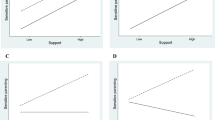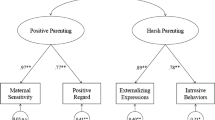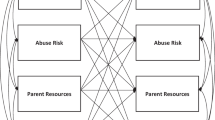Abstract
Many studies have identified associations between maternal depression and decreased quality of parenting. In addition to maternal depression, we examined associations of maternal generalized anxiety and empathy with quality of parenting. Mothers (N = 133) participating in a statewide home visiting implementation study completed baseline and follow-up interviews during which information on demographic and psychosocial characteristics were collected. As part of follow-up data collection, mothers were videotaped for fifteen minutes while playing with their infants, aged 4–13 months, using standardized toys. The videos were coded using qualitative rating scales. Multivariate linear regression was used to assess associations of maternal psychosocial well-being: depression, generalized anxiety, and empathy with two parenting outcomes: sensitive and harsh parenting. Depression and anxiety were negatively associated with sensitive parenting. Empathy was negatively associated with harsh parenting. At follow-up, mothers who screened positive for depression or anxiety exhibited less sensitive parenting than those who screened negative for both conditions. Mothers who screened positive for depression or anxiety at baseline but screened negative at follow-up, had similar sensitive parenting scores to mothers who screened negative at both time points. These findings demonstrate the potential benefits of responding effectively to maternal depression and anxiety and the need for programs to identify and respond to maternal depression and anxiety on a continuing basis, not just at enrollment.
Highlights
-
Maternal anxiety and depression were associated with less sensitive parenting of infants.
-
Maternal empathy was associated with less harsh parenting of infants.
-
Mothers with resolved anxiety or depression parented with similar sensitivity as those never screening positive.
-
Providers should screen perinatal women for depression and anxiety regularly and respond to these conditions.
Similar content being viewed by others
References
Ainsworth, M. S. (1989). Attachments beyond infancy. American Psychologist, 44(4), 709.
Ammerman, R. T., Putnam, F. W., Altaye, M., Stevens, J., Teeters, A. R., & Van Ginkel, J. B. (2013). A clinical trial of in-home CBT for depressed mothers in home visitation. Behavior Therapy, 44(3), 359–372. https://doi.org/10.1016/j.beth.2013.01.002.
Bowlby, J. (1983). Attachment and loss. Volume 1: Attachment. New York, NY: Basic Books (Original work published 1969).
Brown, G. L., Mangelsdorf, S. C., Neff, C., Schoppe-Sullivan, S. J., & Frosch, C. A. (2009). Young children’s self-concepts: associations with child temperament, mothers’ and fathers’ parenting, and triadic family interaction. Merrill-Palmer Quarterly, 55(2), 184–216.
Burrell, L., Crowne, S., Ojo, K., Snead, R., O’Neill, K., Cluxton-Keller, F., & Duggan, A. (2018). Mother and home visitor emotional well-being and alignment on goals for home visiting as factors for program engagement. Matern Child Health, 22(Suppl 1), 43–51.
Caldera, D., Burrell, L., Rodriguez, K., Crowne, S. S., Rohde, C., & Duggan, A. (2007). Impact of a statewide home visiting program on parenting and on child health and development. Child Abuse & Neglect, 31(8), 829–852. https://doi.org/10.1016/j.chiabu.2007.02.008.
Davis, M. H. (1980). A multidimensional approach to individual differences in empathy. Catalog of Selected Documents in Psychology, 10, 85.
Duggan, A., Portilla, X., Filene, J., Crowne, S., Hill, C. J., Lee, H., & Knox, V. (2018). Implementation of evidence-based early childhood home visiting: Results from the mother and infant home visiting program evaluation. OPRE Report 2018-76A. Washington, DC: Office of Planning, Research, and Evaluation, Administration for Children and Families, US Department of Health and Human Services.
Fagan, M. A., Frosch, C. A., Middlemiss, W., LaCoursiere, J. N., Owen, M. T., Hane, A. A., & Welch, M. G. (2019). The practical utility of the Welch Emotional Connection Screen for rating parent-infant relational health. Infancy: The Official Journal of the International Congress of Infant Studies, 24(6), 881–892.
Fairbrother, N., Janssen, P., Antony, M. M., Tucker, E., & Young, A. H. (2016). Perinatal anxiety disorder prevalence and incidence. Journal of Affective Disorders, 200, 148–155. https://doi.org/10.1016/j.jad.2015.12.082.
Feldman, R., Greenbaum, C. W., Mayes, L. C., & Erlich, S. H. (1997). Change in mother-infant interactive behavior: Relations to change in the mother, the infant, and the social context. Infant Behavior & Development, 20(2), 151–163.
Field, T. (2010). Postpartum depression effects on early interactions, parenting, and safety practices: a review. Infant Behavior and Development, 33(1), 1–6.
Frosch, C. A., & Mangelsdorf, S. C. (2001). Marital behavior, parenting behavior, and multiple reports of preschoolers’ behavior problems: mediation or moderation. Developmental Psychology, 37(4), 502–519.
Graham, J. (2009). Missing data analysis: Making it work in the real world. Annual Review of Psychology, 60, 549–576.
Home Visiting Applied Research Collaborative. (2018). About precision home visiting. Retrieved from http://www.hvresearch.org/precision-home-visiting/.
HRSA. (2016). Demonstrating Improvement in the Maternal, Infant, and Early Childhood Home Visiting Program: A Report to Congress March 2016. Washington, DC: Administration for Children and Families, US Department of Health and Human Services, and Health Resources and Services Administration.
Johnston, R., Jones, K., & Manley, D. (2018). Confounding and collinearity in regression analysis: a cautionary tale and an alternative procedure, illustrated by studies of British voting behaviour. Quality & Quantity, 52(4), 1957–1976. https://doi.org/10.1007/s11135-017-0584-6.
Kaitz, M., & Maytal, H. (2005). Interactions between anxious mothers and their infants: An integration of theory and research findings. Infant Mental Health Journal, 26(6), 570–597. https://doi.org/10.1002/imhj.20069.
Kline, R. B. (2015). Principles and practice of structural equation modeling: Fourth Edition. Guilford Press.
Landry, S. H., Smith, K. E., Swank, P. R., & Miller-Loncar, C. L. (2000). Early maternal and child influences on children’s later independent cognitive and social functioning. Child Development, 71(2), 358–375. https://doi.org/10.1111/1467-8624.00150.
Lovejoy, M. C., Graczyk, P. A., O’Hare, E., & Neuman, G. (2000). Maternal depression and parenting behavior: A meta-analytic review. Clinical Psychology Review, 20(5), 561–592.
McFarlane, E., Burrell, L., Duggan, A., & Tandon, D. (2017). Outcomes of a randomized trial of a cognitive behavioral enhancement to address maternal distress in home visited mothers. Maternal and Child Health Journal, 21(3), 475–484. https://doi.org/10.1007/s10995-016-2125-7.
Michalopoulos, C., Lee, H., Duggan, A., Lundquist, E., Tso, A., Crowne, S., Burrell, L., Somers, J., Filene, J. H., & Knox, V. (2015). The mother and infant home visiting program evaluation: Early findings on the maternal, infant, and early childhood home visiting program. OPRE Report 2015-11. Washington, DC: Office of Planning, Research and Evaluation, Administration for Children and Families, US Department of Health and Human Services.
Miller, J. G., Kahle, S., Lopez, M., & Hastings, P. D. (2015). Compassionate love buffers stress-reactive mothers from fight-or-flight parenting. Developmental Psychology, 51(1), 36–43. https://doi.org/10.1037/a0038236.
Mills-Koonce, W. R., Gariépy, J.-L., Propper, C. B., Sutton, K., Calkins, S., Moore, G., & Cox, M. J. (2007). Infant and parent factors associated with early maternal sensitivity: A caregiver-attachment systems approach. Infant Behavior and Development, 30, 114–126.
Murray, L., Lau, P. Y., Arteche, A., Creswell, C., Russ, S., Zoppa, L. D., & Cooper, P. (2012). Parenting by anxious mothers: Effects of disorder subtype, context and child characteristics. Journal of Child Psychology and Psychiatry, 53(2), 188–196. https://doi.org/10.1111/j.1469-7610.2011.02473.
Murray, L., Fiori-Cowley, A., Hooper, R., & Cooper, P. (1996). The impact of postnatal depression and associated adversity on early mother–infant interactions and later infant outcomes. Child Development, 67(5), 2512–2526. https://doi.org/10.2307/1131637.
Nath, S., Pearson, R. M., Moran, P., Pawlby, S., Molyneaux, E., Challacombe, F. L., & Howard, L. M. (2019). The association between prenatal maternal anxiety disorders and postpartum perceived and observed mother-infant relationship quality. Journal of Anxiety Disorders, 68, 102148.
National Institute of Child Health and Human Development Early Child Care Research Network. (1999). Chronicity of maternal depressive symptoms, maternal sensitivity, and child functioning at 36 months. Developmental Psychology, 35, 1297–1310. https://doi.org/10.1037/0012-1649.35.5.1297.
Newland, R. P., Craig, K. A., Cox, M. J., & Mills-Koonce, W. R. (2013). The family stress and maternal psychological symptoms: mediated pathways from economic hardship to parenting. Journal of Family Psychology, 27(1), 96–105.
NICHD Early Child Care Research Network. (1997). The effects of infant child care on infant-mother attachment security: Results of the NICHD study of early child care NICHD Early Child Care Research Network. Child Development, 68(5), 860–879. https://doi.org/10.1111/j.1467-8624.1997.tb01967.x.
Nicol-Harper, R., Harvey, A. G., & Stein, A. (2007). Interactions between mothers and infants: Impact of maternal anxiety. Infant Behavior & Development, 30(1), 161–167.
Owen, M. T. (2016). Qualitative ratings for parent-infant interaction at 3–15 months of age. Unpublished manual.
Reck, C., Tietz, A., Mitho, M., Seibold, K., & Tronick, E. (2018). The impact of maternal anxiety disorder on mother-infant interaction in the postpartum period. PLoS ONE, 13(5), 1–21.
Ross, C. E., Mirowsky, J., & Huber, J. (1983). Dividing work, sharing work, and in-between: Marriage patterns and depression. American Sociological Review, 48(6), 809–823. https://doi.org/10.2307/2095327.
Root, A. E., Hastings, P. D., & Rubin, K. H. (2016). The parenting behaviors of shy–anxious mothers: The moderating role of vagal tone. Journal of Child and Family Studies, 25(4), 1325–1333. https://doi.org/10.1007/s10826-015-0296-2.
Spitzer, R. L., Kroenke, K., Williams, J. B., & Löwe, B. (2006). A brief measure for assessing generalized anxiety disorder: The GAD-7. Archives of Internal Medicine, 166(10), 1092–1097.
Stein, A., Gath, D. H., Bucher, J., Bond, A., Day, A., & Cooper, P. J. (1991). The relationship between post-natal depression and mother-child interaction. The British Journal of Psychiatry, 158(1), 46–52.
Stein, A., Craske, M. G., Lehtonen, A., Harvey, A., Savage-McGlynn, E., Davies, B., Goodwin, J., Murray, L., Cortina-Borja, M., & Counsell, N. (2012). Maternal cognitions and mother–infant interaction in postnatal depression and generalized anxiety disorder. Journal of Abnormal Psychology, 121(4), 795–809. https://doi.org/10.1037/a0026847.
Van Doesum, K. M., Riksen-Walraven, J. M., Hosman, C. H., & Hoefnagels, C. (2008). A randomized controlled trial of a home-visiting intervention aimed at preventing relationship problems in depressed mothers and their infants. Child Development, 79(3), 547–561. https://doi.org/10.1111/j.1467-8624.2008.01142.x.
Vilagut, G., Forero, C. G., Barbaglia, G., & Alonso, J. (2016). Screening for depression in the general population with the center for epidemiologic studies depression (CES-D): A systematic review with meta-analysis. PLoS ONE, 11(5), e0155431 https://doi.org/10.1371/journal.pone.0155431.
Webster-Stratton, C., & Hammond, M. (1988). Maternal depression and its relationship to life stress, perceptions of child behavior problems, parenting behaviors, and child conduct problems. Journal of Abnormal Child Psychology, 16(3), 299–315. https://doi.org/10.1007/BF00913802.
Whiteside-Mansell, L., Bradley, R. H., Tresch Owen, M., Randolph, S. M., & Cauce, A. M. (2003). Parenting and children’s behavior at 36 months: Equivalence between African American and European American mother - child dyads. Parenting: Science and Practice, 3(3), 197–234. https://doi.org/10.1207/S15327922PAR0303_02.
Acknowledgements
The authors thank our partners at NJ Department of Children and Families, NJ Department of Health, as well as local program leadership and staff for their commitment to home visiting research and support of this study. Thanks also goes to Jennica Bouquet who coded all the videos in this study and provided feedback on an earlier version of this manuscript. We would like to thank Dr. Cynthia Frosch, who trained the coders on “Qualitative Ratings for Parent–Child Interaction at 3–15 Months of Age”, was the expert coder, and provided on-going technical support related to coding parent–child interaction. We would also like to thank Dr. Allison West, who provided helpful feedback on this manuscript.
Funding
This work was supported by the following federal grant initiatives: The US Department of Health and Human Services (HHS), Administration for Children and Families (ACF), Children’s Bureau, Office of Child Abuse and Neglect, Supporting Evidence-Based Home Visiting to Prevent Child Maltreatment (EBHV) (2008-2011: Contract No. HHS-2008-ACF-ACYC-CA-0130). The US Department of Health and Human Services (HHS), Health Resources and Services Administration (HRSA), Maternal, Infant, Early Childhood Home Visiting Program (MIECHV) (NJ 2011-2015 Formula Grant Award X02MC23119; NJ 2013-2015 X02MC26333; NJ 2014-2016 Formula Grant Award X02MC27410; NJ 2015-2017 Formula Grant Award X02MC28235; NJ 2016-2018 Home Visiting Grant Program X10MC29491; NJ 2012-2016 Competitive Grant D89MC23540; NJ 2015-2017 Competitive Grant Award D89MC28268.
Author information
Authors and Affiliations
Contributions
K.D.O. wrote the original draft with support from L.K.B. and S.S.C. A.K.D. provided conceptualization, methodology, and funding acquisition. A.K.D., L.K.B., and S.S.C. provided supervision for the study. K.D.O., R.S., and L.K.B. were responsible for data curation and the formal analyses. K.D.O. provided project coordination with support from K.M.G.O. Both K.D.O. and K.M.G.O. constructed the baseline and follow-up survey tools. All authors reviewed and approved the final paper.
Corresponding author
Ethics declarations
Conflict of Interest
The authors declare no competing interests.
Ethical Approval
All procedures performed in this study involving human participants were in accordance with the ethical standards of the IRB at the Johns Hopkins School of Medicine and with the 1964 Helsinki declaration and its later amendments or comparable ethical standards. Informed consent was obtained from all individual participants included in the study.
Additional information
K.D.O., R.S., and S.S.C. completed this manuscript under affiliation with Johns Hopkins School of Public Health.
Rights and permissions
About this article
Cite this article
Ojo, K.D., Snead, R., Burrell, L. et al. Sensitive and Harsh Parenting of Infants: Associations with Maternal Depression, Generalized Anxiety, and Empathic Concern. J Child Fam Stud 30, 2925–2937 (2021). https://doi.org/10.1007/s10826-021-02077-0
Accepted:
Published:
Issue Date:
DOI: https://doi.org/10.1007/s10826-021-02077-0




